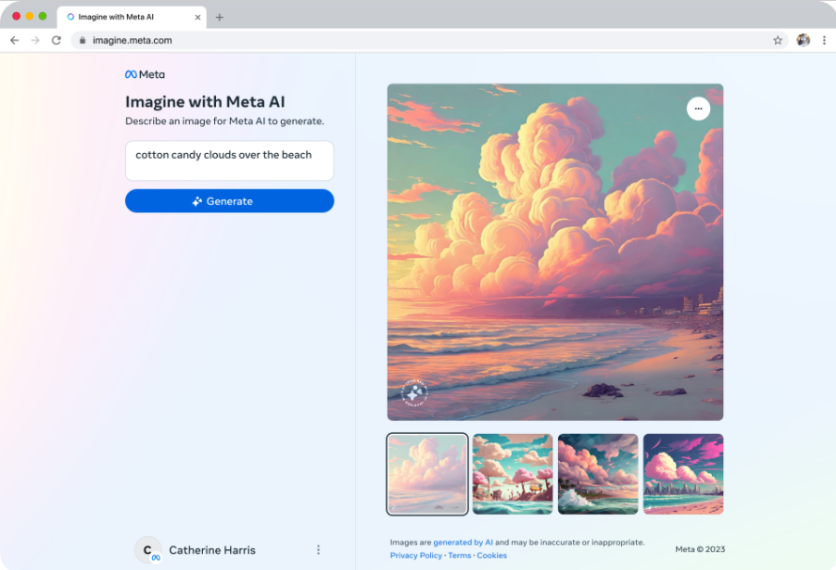Meta has recently unveiled its new standalone AI image generator, Imagine. This tool allows users in the US to create images via simple text prompts on their desktop or mobile devices, Android Authority reports.
Initially confined to the Meta AI virtual assistant within chat apps, the tool now offers a streamlined, user-friendly interface accessible through imagine.meta.com.
"We've enjoyed hearing from people about how they're using imagine, Meta AI's text-to-image generation feature, to make fun and creative content in chats. Today, we're expanding access to imagine outside of chats," Meta said in a blog post.

Meta's Own AI Image Generator
Imagine marks Meta's foray into democratizing AI-generated imagery, distinguishing itself from established counterparts like Midjourney and DALL-E with its simplicity and cost-free accessibility. The tool's interface comprises merely a text box and a 'generate' button, simplifying the process for the average user.
The functionality of Imagine extends to the generation of 1280x1280 pixel images adorned with a discreet watermark, bearing the label "Imagined with AI."
While capable of filtering certain topics and producing aesthetically novel results, Imagine exhibits mixed outcomes in handling diverse prompts and media outputs.
Harnessing the power of Emu, Meta's robust image foundation model, Imagine ensures an intuitive experience for generating images while implementing a groundbreaking feature-a discreet but traceable watermark-aimed at enhancing transparency regarding the AI origins of the produced images.
Questions About User Privacy
Arc Technica tells us that the training data behind Imagine's prowess raises questions regarding user privacy. Drawing from a staggering 1.1 billion publicly visible images sourced from Facebook and Instagram, Meta's AI model essentially leverages fragments of users' publicly available photos from these platforms to fuel its creative engine.
Although the company asserts using only publicly available photos for training, concerns about the inclusion of user images in the dataset persist, prompting considerations about the privacy implications and the potential opt-out mechanisms.
Meta's approach to training its AI models, particularly Emu, stands out in the industry. The company's access to a vast trove of data from its services distinguishes its training methodology from other AI entities, where data collection involves a mix of illicit scraping and licensed stock images.
Emu's training process, termed "quality-tuning," emphasizes aesthetic alignment after pre-training, focusing on a smaller but visually appealing set of images for refinement (Ars Technica).
Despite Meta's attempts to mitigate potential harmful outputs through filters and disclaimers, ethical concerns loom over the tool's ability to generate inaccurate or inappropriate content.
Meta's Imagine emerges as a promising addition to the AI image generation landscape, boasting accessibility, simplicity, and the integration of Emu's powerful image foundation model.
However, its reliance on user-generated data and ethical considerations about its output warrant continued scrutiny as AI-generated imagery becomes increasingly commonplace.
Stay posted here at Tech Times.
Related Article : Meta's Celebrity AI Chatbots Are Now Available Across Its US Apps

ⓒ 2026 TECHTIMES.com All rights reserved. Do not reproduce without permission.




